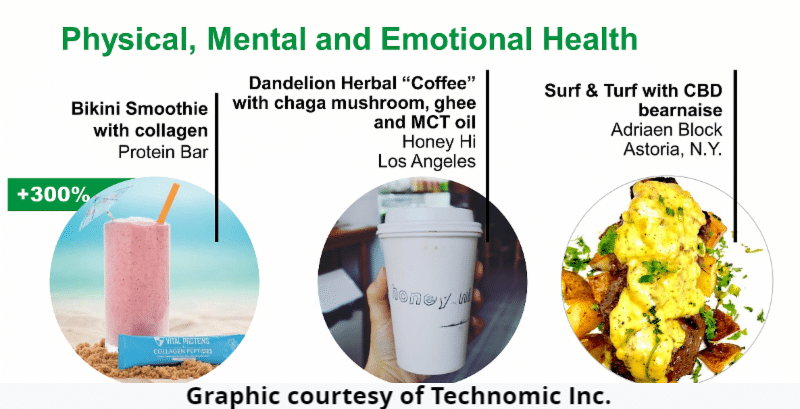Health Concerns Drive Food Choices: Foodservice Menus Adapt
 Health issues continue to drive consumer food choices, and foodservice establishments nationwide are adjusting menus to reflect these concerns. Convenience service operators need to be aware of this trend to win their fair share of the food and beverage sales.
Health issues continue to drive consumer food choices, and foodservice establishments nationwide are adjusting menus to reflect these concerns. Convenience service operators need to be aware of this trend to win their fair share of the food and beverage sales.
A presentation at this year’s National Restaurant Show at Chicago’s McCormick Place documented the shift in menus to healthier fare. Lizzy Freier, managing editor of menu analysis for Technomic Inc., and Nancy Kruse, president of a foodservice consultancy, The Kruse Company, reviewed research from the 2018 Technomic survey.
More than half of consumers in the last two years reported making more food choices based on nutritional benefits: 14 percent said they “agree completely” they are basing choices on nutrition, while 20 percent said they “agree” they are doing it and 30 percent said they “somewhat agree.”
Sixty-seven percent of consumers said they would be more likely to buy food with functional benefits, 32 percent said they would pay more for it and 38 percent said they would try a paleo menu item.
Healthy diets such as vegetarian, keto, paleo, “whole 30” and gluten-free are influencing menus, according to the 2018 Technomic report. Dairy-free, the liquid equivalent of gluten-free, has also made inroads on menus.
Mushrooms are replacing beef on menus, Kruse said, noting that a restaurant in New York City has mushroom brulee with ground porcinis, and one in Los Angeles has earth angel cocktail with garnish and mushroom juice.
Food that enhances physical, emotional and mental health has also become popular, Kruse said. The Protein Bar chain offers Bikini Smoothie with collagen. A restaurant called Honey Hi in Los Angeles offers dandelion herbal “coffee” with chaga mushroom, ghee and MCT oil. Adriaen Block, a restaurant in Astoria, New York, has and Surf & Turf with CBD bearnaise.
Freier said a number of established menu items have received “healthful teases,” such as jackfruit instead of pork, ghee instead of butter, plant-based sugar instead of sugar, carob instead of chocolate, aquafaba instead of egg white and plant-based imitations instead of beef.
Fifty-eight percent of consumers are willing to buy plant-based items, Freier said. Examples include Arooga’s Grille House & Sports Bar chain, which offers Impossible Nachos, and the Sunrise Memphis restaurant in Memphis, Tennessee, which has king’s oatmeal with coconut bacon.
Cannabidiol, better known as CBD, is a compound in the cannabis plant that has become the latest menu craze, Freier said. CBD is a relaxant that should not be confused with THC, another compound in marijuana, she said. There are concerns about CBD’s liability, its effect on a restaurant’s image, its effect on traffic and its procurement policing, she said.
CBD presents challenges since it is not legal in every state, Freier said. However, Carl’s Jr. in Denver serves Rocky Mountain High Cheeseburger Delight with CBD; Astro Doughnuts & Fried Chicken has a chocolate birthday cake donut with CBD infused butter cream frosting; a California restaurant called Lagunitas serves Hi-Fi Hops; a restaurant called California Dreamin’ serves carbonated THC infused drinks; and Alfred in Los Angeles serves CBD enhanced coffees.
Freier and Kruse also discussed changing ethnic influences on foodservice menus, which will be explored in an upcoming Vending Product News issue.
By Roger Stewart, Managing Editor
![]() Home | NEW PRODUCTS | Vending Newsletter sign up | Contact us | email press release
Home | NEW PRODUCTS | Vending Newsletter sign up | Contact us | email press release
Also see: Beverages, Snacks, Foods, Brokers, Chips, Nuts, Energy bars, Fruit Snacks, Meat Snacks, Salty Snacks, Candy, Trail Mix, Gluten Free, Healthy Snacks, Pastries, Cookies, Crackers, Foods, Hispanic Snacks,
Also see: Product Brokers, Product Distributors, Micro Markets | Vending Companies USA
VENDING YELLOW PAGES DIRECTORIES:
Call us at 1-800-956-8363 or POST YOUR COMPANY, GET NEW BUSINESS!




